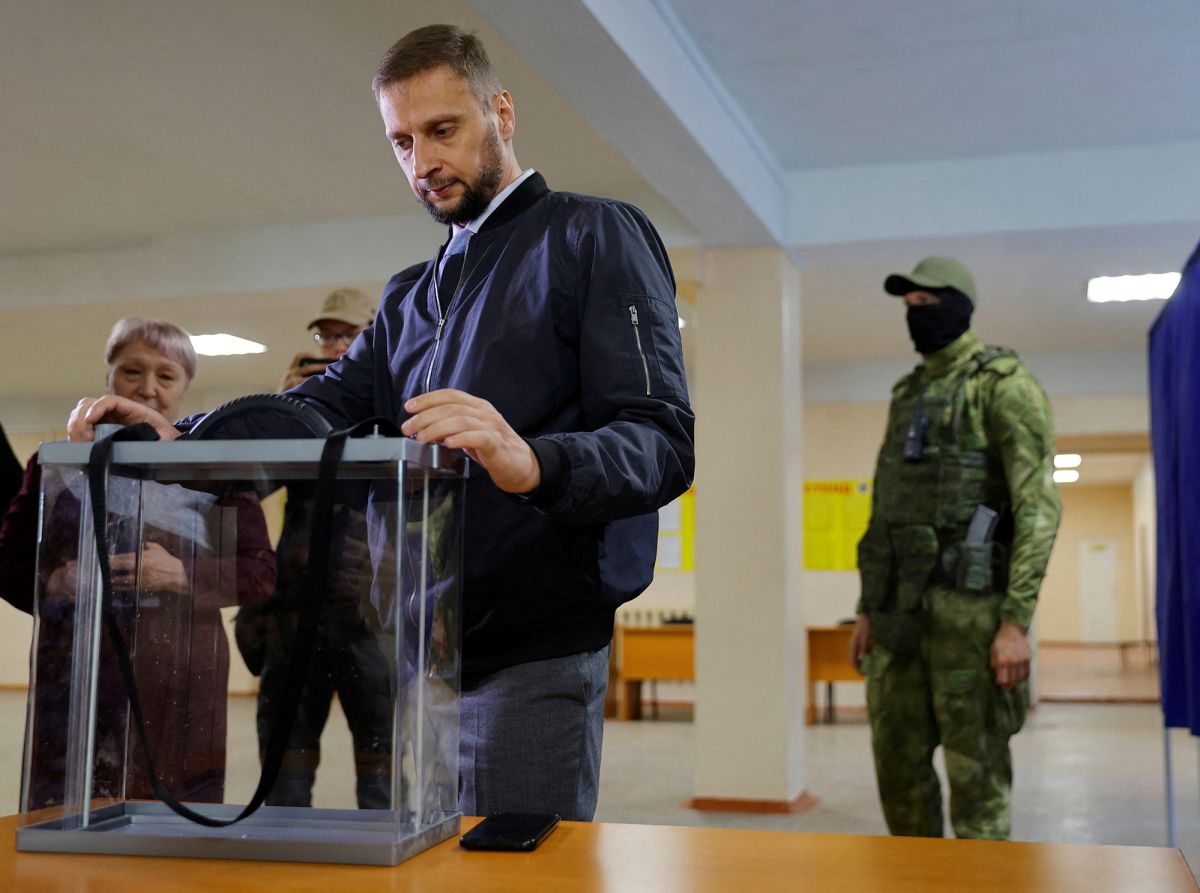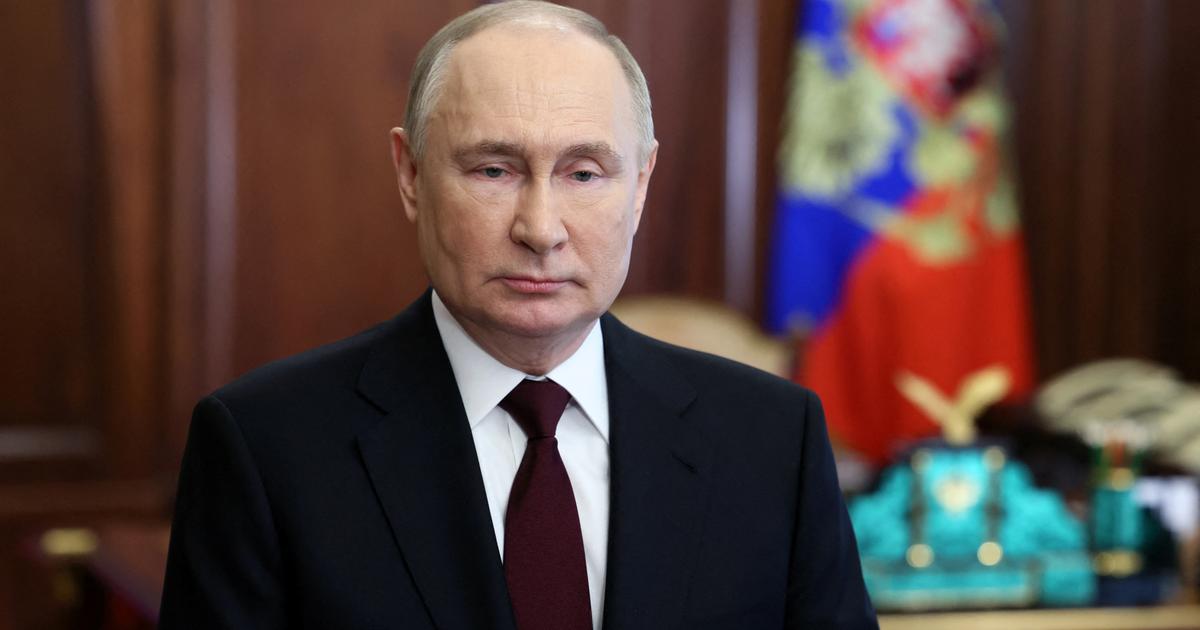Pro-Russians announce majority in favor of joining Russia in referendums 4:18
(CNN) --
Pro- Russian authorities have held so-called referendums in four regions of Ukraine in recent days, and while the votes are illegal and have been universally rejected as "a sham" by Ukraine and Western countries, there are fears they could create a pretext for a new and dangerous stage of the war.
The "votes" come at a time when the conflict, which has been going on for seven months, is at a turning point.
Ukraine's swift counterattacks have caused Russia's leader, Vladimir Putin, to lose momentum on the battlefield and he is expected to step up the invasion in response.
ANALYSIS |
Russia's war in Ukraine is at a dangerous turning point
This means that the "votes", and the false results that Russia and its local allies have claimed, are an important step in Russia's faltering effort to take control of Ukraine.
Here's what you need to know about the referendums and what comes after.
What is happening in parts of the occupied Ukraine?
Votes on joining Russia were held in four Russian-occupied areas of Ukraine, according to their separatist leaders, between Friday and Tuesday.
The votes, which are contrary to international law, could pave the way for Russia's annexation of those areas.
This Wednesday, with all the "votes" counted, the authorities of those regions affirmed, as expected, that the residents had overwhelmingly agreed to become part of Russia.
advertising
The announced figures ranged from 99.23% approval in the Donetsk People's Republic (DPR) to 87.05% in Kherson, controlled by Russia.
Officials from the Luhansk People's Republic (LPR) and Russian-controlled Zaporizhia also affirmed a near-universal verdict.
But those figures bear little resemblance to reality.
An exclusive CNN poll of Ukrainians, conducted in February, just before the Russian invasion, found that in no region of the country did more than one in five people support Ukraine's unification with Russia.
Mysterious leaks affect Russian Nord Stream gas pipelines: was there sabotage? Who would benefit?
This is what we know
And even in the east, the most pro-Russian part of Ukraine, less than a quarter of Ukrainians said that regions that felt most Russian should be allowed to leave Ukraine and become part of Russia.
The survey revealed that 18% of Ukrainians from the east, which includes the Luhansk and Donetsk regions, agreed with the proposal "Russia and Ukraine should be one country", while 16% of Ukrainians from the south, which includes the Kherson and Zaporizhia regions, supported it.
The "outcome" of the votes was probably decided long before the ballots were cast.
"Russia's referendums are a sham, a false pretext for trying to annex parts of Ukraine by force, in flagrant violation of international law, including the United Nations Charter," the US president said last week. Joe Biden.
Ballot questions varied slightly in each of the four regions voted on.
Together, the four regions represent about 18% of the territory of Ukraine.
Residents of the four regions that had moved to Russia could also vote.
The maneuvers follow a pattern similar to that of Russia's takeover of Crimea in 2014. A referendum organized there, in which 97% of voters officially supported annexation, was ratified by Russian lawmakers within a week.
On this occasion, some regions plan to announce their results earlier than others.
Voting was expected to close on Tuesday.
Authorities in Luhansk said they would announce the results the day after the vote was completed, while in Kherson, authorities would wait five days after the polls closed.
This means that the claimed results will have been announced early next week.
However, they could arrive sooner.
The UK Defense Ministry said "there is a realistic possibility" that Putin will use his speech to the Russian parliament on Friday to "formally announce the accession of the occupied regions of Ukraine to the Russian Federation."
Pro-Russians announce majority in favor of joining Russia in referendums 4:18
What do we know about "voting"?
Reports from affected locations suggest that voting is taking place essentially, and in some cases literally, at gunpoint.
Serhii Hayday, the Ukrainian head of the Luhansk Region Military Administration, said authorities were going from door to door, followed by armed guards, to collect votes.
"If someone marked 'against' joining Russia, the data is recorded in notebooks," Hayday said on Telegram.
"The rumor is spreading that people who vote against are being taken somewhere. This is done deliberately to intimidate the local population."
A service member from the self-proclaimed Donetsk People's Republic walks past a banner outside a polling station.
Credit: Alexander Ermochenko/Reuters
Russian-backed authorities said turnout in the election was massive, with figures that Kyiv and Western observers have ridiculed.
Meanwhile, for Ukrainians in the occupied territories where the referendums were held, the escape routes are dangerous.
The occupied zone of Kherson was "completely closed for entry and exit" after its "vote", the General Staff of the Ukrainian Armed Forces said on Tuesday.
Getting in and out of the occupied part of the neighboring Zaporizhia region is also very difficult for civilians and almost impossible for men between the ages of 18 and 35, said Ukraine's National Resistance Center, a unit of the Defense Ministry.
What does Russia want from these so-called referendums?
In terms of international law, referendums will achieve nothing because the world community adamantly refuses to accept them.
But at home, Putin will be able to claim that the will of the occupied Ukrainians is to belong to Russia, thus giving a false pretext to his efforts to claim that territory as Moscow's own.
The UK Foreign Minister, James Cleverly, stated in recent days that Russia had decided in advance what will happen after these referendums are over, stating that "by the end of the month, Russia's intention will be to formalize the annexation of the four regions to the Russian Federation".
This has raised concerns that Putin will try to escalate the war once the "results" are announced.
A successful counteroffensive by Ukrainian forces has pushed Russia back significantly in northeastern Ukraine.
Western officials have suggested that Putin will likely try to reframe that and any other counteroffensive as an attack on Russia's sovereignty.
Foreign Minister Sergey Lavrov has already alluded to that position in recent days, stating over the weekend that Moscow reserves the right to "fully protect" areas that have formally become its territory.
Announcing a "partial mobilization" of Russian citizens, in a speech last week, Putin even raised the possibility of nuclear weapons, saying he would use "all means at our disposal" if he felt that Russia's "territorial integrity" I was in danger.
But the context of the war is crucial to understanding why these snap votes are being held, and the threats from the Kremlin that surround them.
In recent weeks, Ukrainian forces have turned the conflict on its head, staging rapid counterattacks that have pushed Russia militarily back.
It is an embarrassing situation for Putin, seven months after launching an invasion that many thought would be completed in days.
And it appears to have raised concerns among some of Russia's international allies, such as China.
Meanwhile, at home, Putin's "partial mobilization" of citizens has caused chaos, with protests, apparent drafting errors and an exodus of citizens fleeing Russia.
Hundreds of arrests in Russia in anti-war protests 0:43
Putin's situation looks increasingly dire as he seeks a shift in the balance that will allow Russian forces to regain the upper hand.
The organization of fake referendums appears to be a key part of his effort to force change.
Police officers detain a man in Moscow amid protests against the mobilization of citizens ordered by Putin.
Credit: ALEXANDER NEMENOV/AFP via Getty Images
What comes next for these regions?
The Kremlin is likely to immediately treat the territories as if they were parts of Russia now that the votes have been claimed.
"All state territory of Russia that has already been or may be further formalized in the Constitution of our country will certainly benefit from full protection," Lavrov told a news conference in New York on Saturday.
"How can it be otherwise? All the laws, doctrines, concepts and strategies of the Russian Federation are applicable throughout its territory."
There is concern that Ukrainians from Russian-controlled parts of the country will be recruited by their occupiers.
Ukrainian officials say Russia is using the votes as a pretext to recruit Ukrainians into the Russian Army.
"The main goal of the fake referendum is to mobilize our residents and use them as cannon fodder," Ivan Fedorov, the exiled Ukrainian mayor of Russian-occupied Melitopol, said on Telegram.
Ukraine's National Resistance Center said in a statement last week: "It is clear that after the referendum, the enemy will announce the mobilization also in the occupied lands because it needs human resources."
The Government of Ukraine affirms that the Russian occupying administrations, together with the Federal Security Service (FSB) of Russia, are drawing up lists of thousands of people who will be mobilized in Zaporizhia and Kherson.
In the Luhansk region – occupied almost entirely by Russia and Russian-backed forces – Ukrainian officials say the self-proclaimed Luhansk People's Republic is already engaging in widespread conscription.
How has the international community responded?
The West and NATO immediately dismissed the vote as a stunt, making it clear there will be no change in their support for Ukraine.
"NATO's response is to increase support," alliance secretary general Jens Stoltenberg said in an interview with CNN's Julia Chatterley on Friday.
"The best way to end this war is to further strengthen the Ukrainians on the battlefield, so that at some point they can sit down and come to a solution that is acceptable to Ukraine and preserves Ukraine as a sovereign nation and independent in Europe.
US officials expect Russia could move quickly to annex the four zones, potentially within days of the vote.
Doing so would provoke a swift response from the United States, which has vowed not to acknowledge the results, an official said.
In the short term, another round of sanctions on Russia seems likely once the results of the votes are declared.
National Security Adviser Jake Sullivan said Sunday in an ABC television interview that the G7 countries "reiterated that there would be consequences and specified that this would include additional enhanced sanctions, including sanctions on entities and companies outside of Russia. who are supporting the Russian war machine or supporting these fake referendums or Russia's efforts."
"So you'll see in the next couple of days that the United States will have more announcements if Russia goes ahead with this," Sullivan said.
US privately warned Russia about using nuclear weapons against Ukraine for several months
But it is clear that the prospect of an escalation of the war has heightened concern about what comes next, especially when it comes to nuclear weapons.
"Russia understands very well what the United States would do in response to the use of nuclear weapons in Ukraine because we have explained it to them," Sullivan said, as officials are working to reassure their populations and global allies.
Although officials have seen no indication that Russia is planning to use nuclear weapons any time soon, they are more concerned about that possibility now than they were six or seven months ago, an official confirmed to CNN, though they continue to maintain that the likelihood of Russia do is low.
-- Mick Krever, Tim Lister, Olga Voitovych, Amy Cassidy and Kaitlan Collins contributed reporting.
War in RussiaReferendum



/cloudfront-eu-central-1.images.arcpublishing.com/prisa/TP3BD7YNYFDP3JYTJUSHNEPYHQ.jpg)

